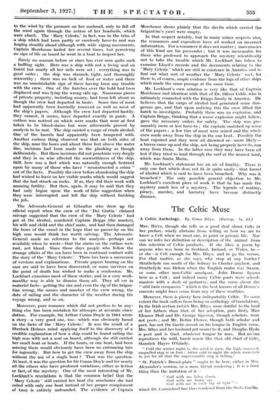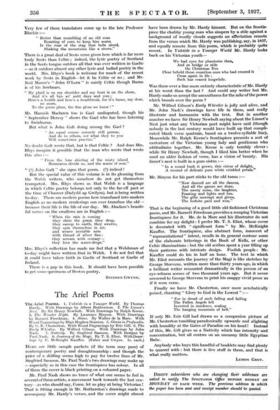The Celtic Muse
A Celtic Anthology. By Grace Rhys. (Harrap. 7s. 6d.)
MRS. RHYS, though she tells us a good deal about Celts in her preface, wisely abstains from telling us how we are to know a Celt when we meet one, in print or private life. Nor can we infer her definition or description of the animal from this- selection of Celtic products. If she likes a poem by anyone who was born in Scotland, Ireland, or Wales, he-- or she--,--is Celt- enough for Mrs. Rhys, and in go the verses. For that matter, as she says, why stop at any border ? Strathclyde ran south of the Solway to Chester anyhow, and Strathclyde was Briton when the English realm was Saxon, or some other non-Celtic amalgam. John Donne figures here as a Celt ; and indeed many Celtic poets were school- masters with a dash of pedantry, and the verse about the " stiff twin compasses -" which is the best known of all Donne's conceits might have come from any of these worthies.
However, there is plenty here indisputably Celtic. To some extent the book suffers from being an anthology of translations. In the Irish section (which Mrs. Rhys, more dutiful to the land of her fathers than that of her adoption, puts first), Miss Eleanor Hull and Dr. George Sigerson, though scholars, were not poets ; and Mr. Robin Flower, though both scholar and poet, has not the Gaelic accent on his tongue in English verse. Mrs. Rhys and her husband get nearer to it, and Douglas Hyde is poet and is Gad, whatever tongue lie uses. But no one reproduces the wild, harsh music like that old chief of Celts, Standish -Hayes O'Grady.
" Cold the -winter night is. the wind is risen, the high-court gal, unquelled stag is on foot : bitter cold-to-night the whole moulduin is, yet for all that the ungovernable stag is belling."
" St. Patrick's Breast-plate " ought to be here, either in Mrs. Alexander's version, or a more literal rendering ; it is a finer thing than the imitation of " Clod with me lying clown,
• • Cod with me rising up,
Cod with mo in each ray of light"—
which Dr. Carmichael has thus rendered from the Scots Gaelic. Very few of these translators come up to the late Professor Blackie :—
" Better than mumbling of an old man Roasting of corn to keep him warm
Is the roar of the stag that bells aloud, Shaking the mountains like a storm."
There is a great deal of Scots verse given here which is far more truly Scots than Celtic ; indeed, the lyric poetry of Scotland
in the Scots tongue outdoes all that was ever written in Gaelic —as it outdoes almost any other lyric and ballad poetry in the world. Mrs. Rhys's book is welcome for much of the recent work by Scots in English—let it be Celtic or no ; and Mr. Neil Munro's " John O'Lorn " is surely Celtic though Burns is of his forebears.
" My plaid is on my shoulder and my boat is on the shore, And it's all bye wi' auld days and you ;
Here's a health and here's a heartbreak, for it's hame, my dear, no more, To the green glens, the fine glens we knew !"
Mr. Hamish Maclaren too is Gael undisputed, though his " September Heresy " shows the Gael who has been listening to Swinburne.
But what is Jolm Galt doing among the Gael ?
An equal course serenely still pursue, And do to others, not what they to you Will sometimes practise."
No doubt Galt wrote that, but is that Celtic ? And does Mrs. Rhys imagine it possible that the man who wrote that wrote this also :— " From the lone shieling of the misty island Mountains divide us, and the waste of seas."
" (?) John Galt " she signs that poem. (?) indeed !
But the special value of this volume is in its gleaning from the Welsh writers, who somehow no not get themselves trumpeted. Mrs. Rhys shows us that Welsh is a language in which Celtic poetry belongs not only to the far-off past or the time of Chaucer (Dafydd ap Gwilym), but is being written to-day. There are modern poems here transfused into modern English as no modern renderings can ever transfuse the old— because their life is the life of our day. Mr. Abadam's beauti- ful verses on the swallows are in English :—
" When the rain is coming
they skim the grass, they drop, they swoop to earth, they swerve, they spin themselves in air, and weave invisible nets with thread of silver flax :
they scream with ecstasy—
they love the water-drops."
Mrs. Rhys's collection has made me feel that a Welshman of to-day might have written that in Welsh. I do not feel that it could have taken . birth in Gaelic of Scotland or Gaelic of Ireland.
There is a gap in this book. It should have been possible to get some specimens of }Ireton poetry.
STEPREN GWYNN.











































 Previous page
Previous page